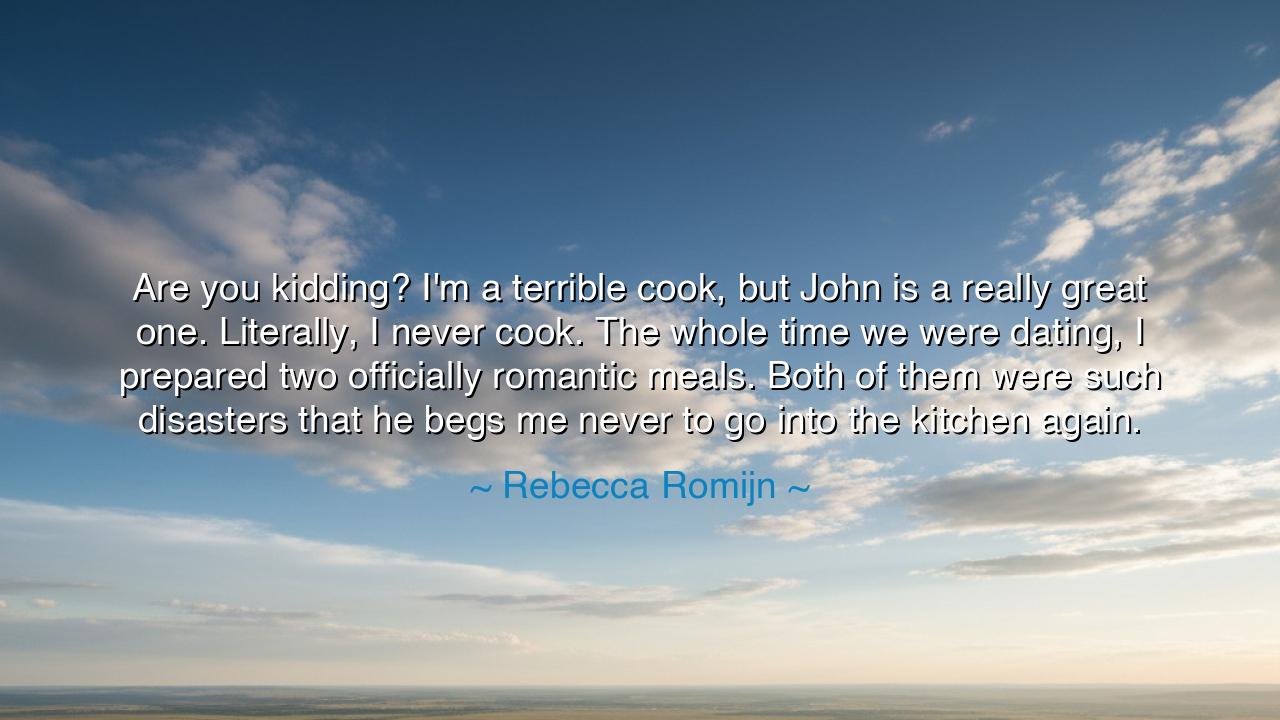
Are you kidding? I'm a terrible cook, but John is a really great
Are you kidding? I'm a terrible cook, but John is a really great one. Literally, I never cook. The whole time we were dating, I prepared two officially romantic meals. Both of them were such disasters that he begs me never to go into the kitchen again.






In the words of Rebecca Romijn, “Are you kidding? I’m a terrible cook, but John is a really great one. Literally, I never cook. The whole time we were dating, I prepared two officially romantic meals. Both of them were such disasters that he begs me never to go into the kitchen again.” — there is a lightness of spirit, but also a hidden wisdom about love, humility, and the acceptance of one’s place within harmony. Beneath the laughter lies a truth as old as the human heart: that the strength of any partnership is not found in sameness, but in balance — in the dance of gifts and flaws, of effort and grace. Hers is not a confession of inadequacy, but a celebration of difference, of the beautiful truth that love thrives when each person brings what they have, and honors what they do not.
In the age of the ancients, the philosophers spoke often of the harmony that arises when opposites unite. Aristotle called this the “golden mean,” the perfect balance between excess and deficiency. So too does Rebecca’s story remind us that the perfection of a union does not lie in shared skill, but in mutual understanding and complement. She is not the master of the kitchen, but she is a partner in laughter, in affection, and in the humility to allow another’s strength to shine. When she admits her own culinary disasters, she speaks not with shame, but with joy — for in love, vulnerability is not weakness, but trust made visible.
The ancients would see in this tale a reflection of the myth of Hephaestus and Aphrodite — two beings of utterly different natures, one a craftsman of fire and metal, the other a goddess of beauty and love. Their union, though imperfect, symbolized the truth that every relationship is a blending of unlike elements. Where one brings precision, the other brings passion; where one creates, the other inspires. So it is with Rebecca and her John: in their partnership, the hearth becomes a place not of competition, but of laughter, not of duty, but of delight. Her failure at cooking becomes, paradoxically, a source of intimacy — a reminder that love grows not through perfection, but through shared imperfection.
To “never go into the kitchen again” might seem at first a humorous surrender, but it is also a gesture of wisdom — the knowing that one need not excel in all things to be worthy of love. The ancient Stoics taught that peace comes when a person accepts their nature and uses their energy toward what they can do well. In this, Rebecca’s words echo that same philosophy: she does not waste her spirit on pretense or pride, but finds joy in her honesty. By stepping aside, she gives space for her partner’s gift to flourish — and in doing so, their relationship deepens in respect and laughter, which are far more nourishing than any feast.
Consider the example of Marcus Aurelius and Faustina, the Roman emperor and empress, whose marriage was known for its storms as much as its love. Marcus, ever contemplative, wrote in his Meditations that one must “accept the failings of others as one accepts their own.” Though history remembers his wisdom more than her grace, their story teaches that love endures not because both partners are equal in every talent, but because each chooses patience, humor, and forgiveness. Rebecca’s tale, told in jest, reflects the same truth — that the true art of partnership is not mastery of skill, but mastery of the heart.
In the laughter of her confession, we also hear a call to abandon the illusion of perfection that burdens so many modern souls. The ancients valued authenticity over performance, and so should we. To admit one’s limits with joy is to be free; to laugh at one’s own shortcomings is to invite others to love us more deeply. Rebecca’s humor becomes a mirror — reminding us that we are most lovable not when we perform flawlessly, but when we live truthfully and love cheerfully. The kitchen, in her story, becomes the stage of humility — a small place where great love is tested and proven by laughter.
So let us draw from this a lasting lesson: embrace your imperfections, and honor the strengths of those around you. Do not measure love by skill or achievement, but by warmth, gratitude, and grace. If you fail — and you will — let it be with laughter, and let your laughter bind you closer to those who love you. Every home has its burned dinners, its spilled sauces, its small disasters — yet these, too, become part of the feast of life when shared with joy.
For in the end, as Rebecca Romijn reminds us with gentle mirth, the recipe for happiness is not found in perfect cooking, but in perfect acceptance. Let the heart be your hearth, let laughter be your meal, and let humility season every dish of life. Then, even your disasters will become delicious — because they were served with love.






AAdministratorAdministrator
Welcome, honored guests. Please leave a comment, we will respond soon